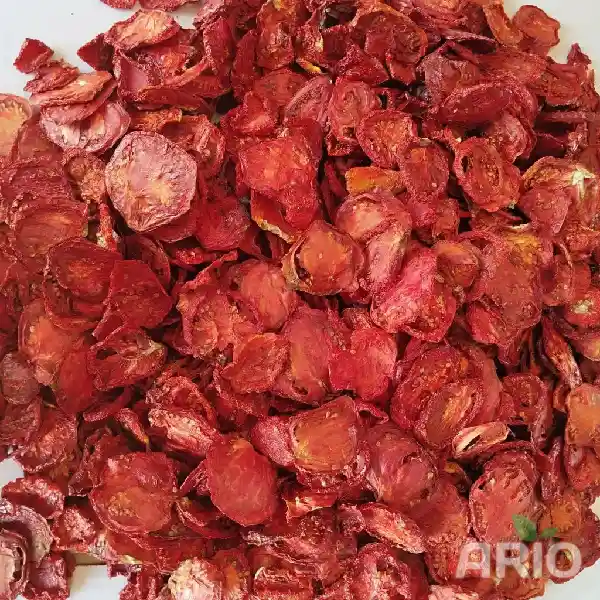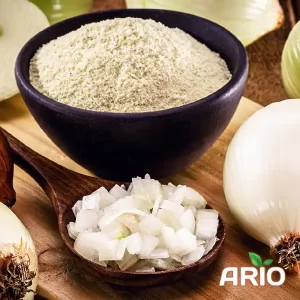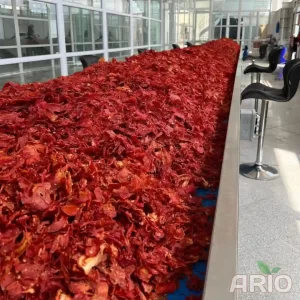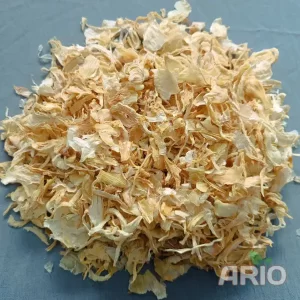Dried Tomato
Dried tomato production stages at the Ario factory with new facilities
Understanding Dried Tomatoes and Their Market Potential
Dried tomatoes, a staple in the global food industry, are widely used in culinary applications for their intense flavor and long shelf life. They are produced through sun-drying or dehydration methods, which enhance their taste and texture. As the demand for dried tomatoes increases worldwide, understanding the market trends, major players, and quality standards is essential for traders.
Global Market Overview for Dried Tomatoes
The dried tomato market has experienced steady growth due to rising demand in the food processing and hospitality industries. The market size is expanding, with projections indicating continued growth due to increased consumer preference for natural food preservatives.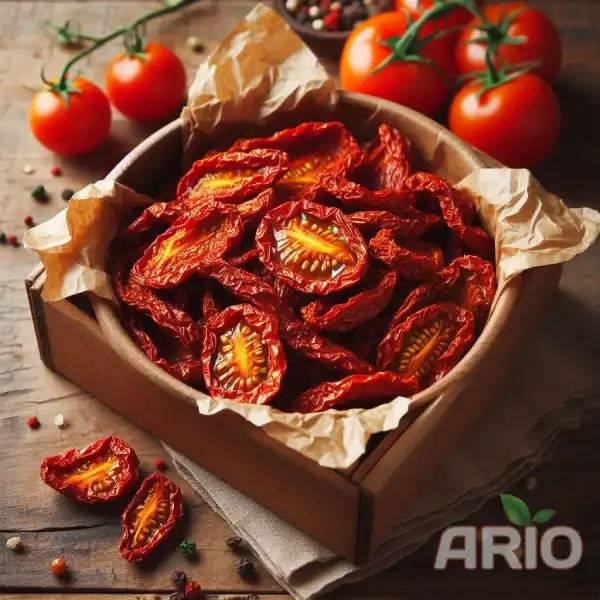 Supplier of Dried Tomato Powder
Supplier of Dried Tomato Powder
Key trends driving the market include:
Growing demand for organic and preservative-free dried tomatoes Expansion of international trade due to improved logistics and supply chains Increased adoption in the foodservice industry, especially in Mediterranean and Italian cuisinesread more: Dried Vegetables
Leading Exporters of Dried Tomatoes
Several countries dominate the dried tomato export market, including:- Italy – Renowned for premium-quality sun-dried tomatoes, Italy exports to markets in Europe and North America.
- Turkey – A major exporter with competitive pricing and large-scale production facilities.
- China – Supplies dried tomatoes at lower costs, catering to high-volume buyers.
- Iran – Emerging as a strong player in the dried fruit and vegetable trade.
Table Leading Exporters of Dried Tomatoes
| Country | Features | Target Markets |
|---|---|---|
| Italy | Premium quality, sun-dried | Europe, North America |
| Turkey | Competitive pricing, large-scale production | Europe, Asia |
| China | Low cost, suitable for bulk buyers | Global |
| Iran | Emerging player with growing exports | Middle East, Europe |
Major Importing Countries and Market Demand
Leading importers of dried tomatoes include: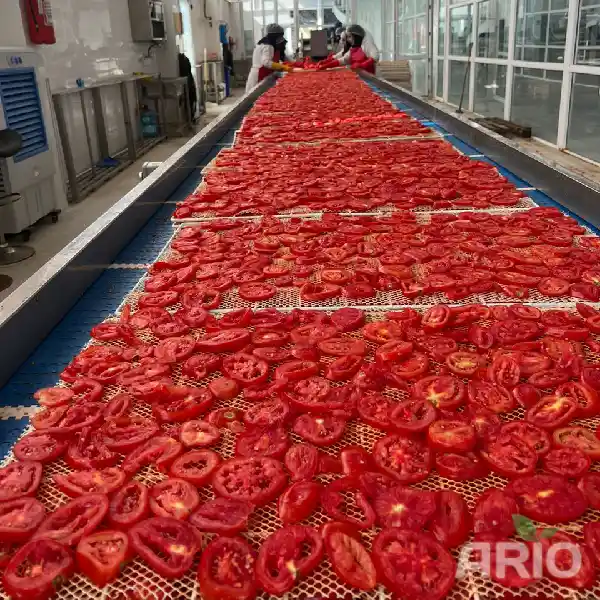 Tomato slices before drying
Tomato slices before drying
- United States – High demand from food manufacturers and gourmet food markets.
- Germany – One of Europe’s top importers, emphasizing organic and high-quality products.
- Japan – Prefers premium-quality dried tomatoes for its food industry.
- United Kingdom – Strong demand in the retail and foodservice sectors.
Quality Standards and Certifications
For successful international trade, dried tomatoes must meet stringent quality standards. Important certifications include:- ISO 22000 – Ensures food safety management compliance.
- HACCP (Hazard Analysis and Critical Control Points) – A global standard for identifying and controlling food safety hazards.
- USDA Organic Certification – Required for organic dried tomatoes exported to the U.S.
- EU Organic Certification – Essential for products entering the European Union.
Pricing Strategies in the Global Dried Tomato Market
Pricing varies depending on several factors:-
Production Costs
-
Quality Grades
-
Market Demand
-
Logistics and Tariffs
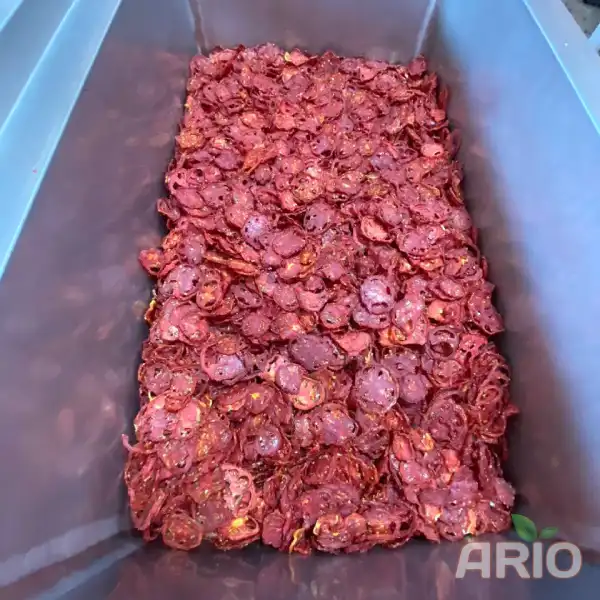 Dried tomatoes at the Ario factory
Dried tomatoes at the Ario factory
Regulatory Compliance for Import and Export
Navigating trade regulations is crucial for seamless transactions. Key considerations include:- Import Restrictions – Some countries impose restrictions on sulfite-treated dried tomatoes.
- Labeling Requirements – Proper labeling with ingredient and origin details is mandatory.
- Customs Documentation – Import/export licenses, health certificates, and phytosanitary certificates may be required.
Challenges and Risk Management in the Dried Tomato Trade
While the dried tomato business is lucrative, it comes with challenges such as:- Fluctuating Prices – Currency exchange rates and production costs impact pricing stability.
- Quality Control Issues – Ensuring consistency in texture, color, and taste is crucial.
- Supply Chain Disruptions – Delays due to transportation or trade restrictions affect timely delivery.
Strategies to mitigate risks:
- Establish relationships with reliable suppliers.
- Regularly test product samples for quality assurance.
- Diversify sourcing to avoid over-reliance on one region.
Supplier Selection and Verification
Choosing the right supplier is vital for maintaining product quality and business credibility. Steps to verify supplier authenticity include:- Check Certifications – Ensure compliance with international quality standards.
- Request Product Samples – Evaluate texture, moisture content, and overall quality.
- Review Trade History – Research past export records and customer feedback.
- Conduct On-Site Inspections – If feasible, visit the supplier’s facility to assess operations.
Success in Dried Tomato Trading
Several successful importers have leveraged strategic partnerships and quality control measures to build profitable businesses. For example, a European distributor expanded its market share by sourcing premium sun-dried tomatoes from Italy, emphasizing quality and sustainability.Dried tomato production process
Conclusion
Understanding the dynamics of the dried tomato trade is crucial for importers and exporters aiming to thrive in this competitive market. By selecting reliable suppliers, adhering to international standards, and staying informed about market trends, businesses can successfully navigate the complexities of dried tomato commerce. Whether you are an established trader or a new entrant, strategic planning and industry knowledge will be your key to success.
FAQs About Dried Tomato Trade
1. Which countries export the highest quality dried tomatoes?
Italy, Turkey, and Iran are known for premium-grade products.
2. How can I ensure the quality of imported dried tomatoes?
Work with certified suppliers, conduct laboratory tests, and request product samples.
3. What are the main quality certifications for dried tomatoes?
ISO, HACCP, USDA Organic, and EU Organic certifications.
4. How are dried tomatoes priced in international trade?
Pricing depends on quality, production costs, demand, and logistics expenses.
5. Which markets have the highest demand for dried tomatoes?
The U.S., Germany, Japan, and the U.K. are major importers.
6. How can I find reliable dried tomato suppliers?
Check trade records, visit production sites, and verify certifications.

